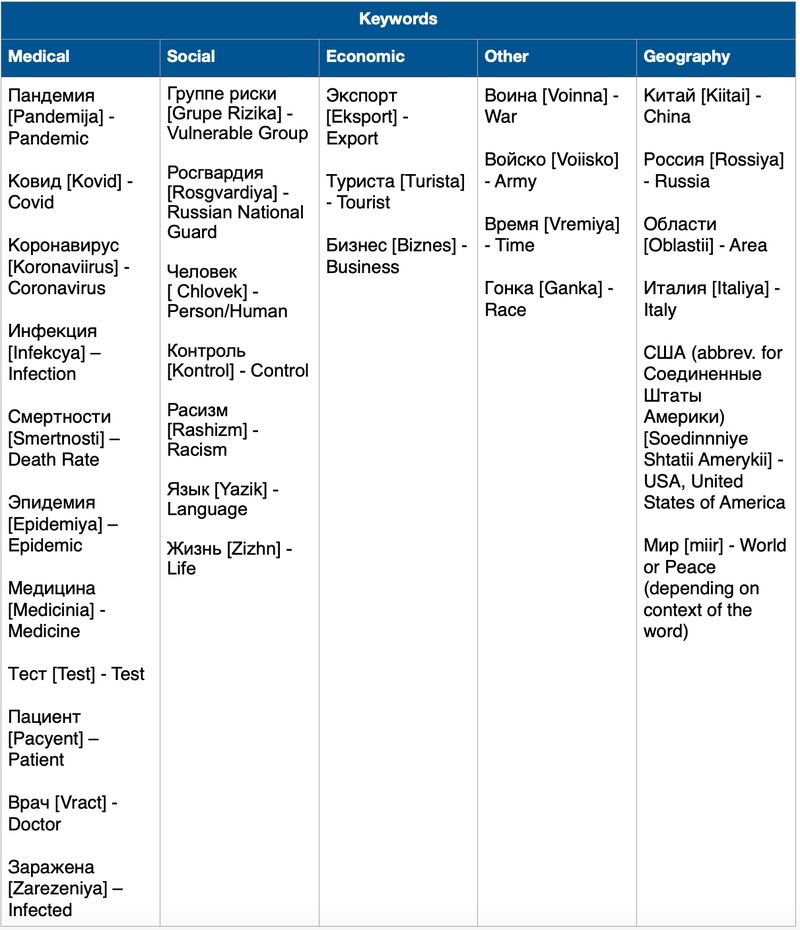Student ambassador: Pola Awdankiewicz-Baeta

Correlations:
- The most common correlations would appear to be between words like vulnerable group and death toll. This would usually appear in the narrative surrounding new information about the Coronavirus, such as which groups are vulnerable, how you can protect yourself against the new virus when outside etc. This pair would increase in frequency as time went on, and the word death toll would start pairing with other words such as Italy, USA, Russia, infections and more.
- Another popular correlation was between the ‘world’, ‘human’ and ‘life’. This is interesting as it demonstrates that there was a moral debate about human life being questioned in the Russian media. During moments of crisis, humanity is questioned. This debate sparked questions about how life will change in Russia and worldwide. Often, popular notions of the end of the world are also debated – like the 2012 end of the world as predicted by the Mayan Civilization.
- Another correlation, albeit less popular but very interesting, is the one between the word race and Covid-19. This seems to relate back to the 1960s when Russia was in a race with the USA to see which country would be the first in space. The day Gagarin went to space is an extremely important day in Russia, and it is celebrated loudly by this proud and loyal nation. Flashforward to 2020; the race this time is to find the cure for the Coronavirus.
General Findings:
- Between the 5-month period that we were analysing, only 57 days successfully reported the Coronavirus using terms like Covid, Coronavirus, Pandemic, Epidemic or the Russian equivalent of those terms.
- The day with the most articles was the 27th of April 2020, with 106 articles. Often, it would appear that there are more articles, but after careful consideration and taking away the ones that would appear in English, the final number would be much lower.
- There were several days with only 1 article. These days were: 29.03, 11.04, 03.04 and 11.02. Besides the date in February, when the Pandemic was not as widely reported yet, the other dates do not seem to follow a trend with why there are so few articles on those days.
- An average day would show between 40-50 articles per day, some even reaching nearly 60-70. I understand that for my languages, these are rookie numbers, but for Russian, it was very interesting to see that there was a clear pattern with the number of articles displayed per day.
- January, and February, as many people can expect, had the least number of articles. Close to zero – even! In January, the Pandemic was not widely reported. If it was, it was discussed as a Chinese issue, not something that Russia or the rest of the world was worried about.
- Of course, the term Covid-19 did not exist then yet, so Coronavirus or simply Virus, were the most common terms. Sometimes, the term Chinese Virus would also be used.
- The Coronavirus Pandemic seemed to identify itself as a societal issue more than an economic or medical issue. Very rarely were the pressures of the economy mentioned, such as the job market being difficult. The value of the ruble also went down by 8.20%; however, these issues were not as widely reported by the media.
- RT (Russia Today) is a very common broadcasting agency. It is, however, known for biased Russian news. When researching this network, I would take things with a pinch of salt. This type of network would also be more prone to spreading fake news. Other publications are more respected and trustworthy.

Discussion
- Russia banned fake news surrounding the Coronavirus Pandemic. This was done in order to be able to coherently orchestrate the safety measures surrounding the Pandemic, i.e. the wearing and use of masks and gloves and implementing changes in stores. Fake News is extremely widespread in Russia; this is due to the news discourse being drastically different when reported by the Russian media and Western media. In this case, fake information was being spread about the Coronavirus Pandemic and its number of deaths across Russia and the World.
- An interesting find is how common the words ‘war’, ‘army’ and ‘soldiers’ were. For context, Russians are extremely patriotic. Often, the army would come out on national holidays, join the celebrations, and perform. The last few months were difficult for the Russian public as their most looked forward to celebrations and parades were cancelled. Every year on Victory Day (08.04), when the Russians celebrate the surrender of the Nazis and the end of the war, the Russian army commemorates this occasion with a huge parade. Instead, Russia has agreed to combine two events: the 75th Diamond Jubilee of the surrender of the Nazis as well the historic Moscow Victory Parade of 1945. This parade will take place on 24.06.2020.
- During the last few months of the pandemic, the Russian papers were often mourning the idea that the Victory parade wasn’t going to happen this year. Therefore, terms such as ‘army’ and ‘soldiers’ were popular in the Russian media. Often, they were used in discourse relating to the parade; however, on some days, they were used in context with preparations of an actual war. The Росгвардия [Rosgvardiya] – Russian National Guard was mentioned as many as 72 times in one day, usually when discussing Russian border control due to the Coronavirus Travel ban or when discussing the enforcement of rules in cities; i.e the curfew, and the home isolation.
- A frequent topic for discussion for the Russian media was the differences between Russia and the EU. The Russian media would often discredit the EU’s efforts to stop the Pandemic. The most common topics were often discussed how early/late borders were closed, how the Police enforced rules, and how the hospitals were coping with the sick.
- Generally speaking, there was a lack of coordination between all the states in Russia. There are 85 subject states and 22 republics in Russia. Of course, Russia’s territory is extremely large, and I can imagine that it is hard to reach parts of the population, especially those living in the North-East and Siberia; however, the general lack of consideration for the different states was very visible. The most attention was received by cities like Moscow and St. Petersburg. Many believe this was necessary, as Moscow was hit the most with Coronavirus infections. However, a lot of the eastern states, especially the ones with a clear Chinese border, were not receiving the same attention and the same restrictions. Perhaps, settling clear restrictions earlier on would have been more beneficial for controlling the virus.
- Russia closed its borders with China on 03/01/2020. That was quite late as many countries bordering China closed their borders much sooner. Russia shares a 5,000 KM border with China, and they have extensive trade deals in place, so closing the border sooner would have been a better idea.
- Russian media would often discuss the Coronavirus from the perspective of Italy and later the USA. As those were the two countries that were hit quite hard by the number of infections and deaths. Often, the Russian media would blame Italy for the spread of the Coronavirus in Europe as well as Eastern Russia. Italy is also a very popular travel destination for Russians, so many assumed that is how the virus spread across Russia.
- There were a lot of articles from the past Soviet states, like: Azerbaijan, Georgia, Armenia etc. Besides reporting in their own language, these countries would often report in Russian, as well, as Russian is still commonly spoken there. These countries would often report about Russia's pandemic and discredit Putin and his ability to lead. The discourse would often mention that they believe that Putin has no legitimacy and credibility when leading his country into safety.
- There was a small number of articles surrounding issues of racism around the world. After the virus spread in China, a lot of Chinese people were faced with racism. Thankfully, the media reported this as something unacceptable. It was interesting to see the Russian media report this, as usually Russia is known as a racist and less-accepting country compared to many others. However, over the years with the job market opening in Russia, and more and more people of different races moving there, it has become more open and accepting.
Close reading analysis:
No articles were available on the dates: 03/01/2020 and 08/02/2020. The close reading analysis will focus on the two final dates: 06/03/2020 with 9 articles total and 26/04/2020 with 33 articles total.
Does this close reading match findings from the distant reading? / What is its general narrative/ discourse?
06/03/2020
These days, the articles follow the same pattern as the data mining, as my analysis shows. Most of the articles discussed the situation in Italy; in early March, the whole world followed Italy and their regression with the virus. One of the articles mentioned a press release from the Italian Embassy in Russia that recommended that all Italian citizens visiting Russia should return home immediately, contact the Embassy if they are feeling ill, or if they have not yet left for Russia to completely postpone their trip. This article came out on the same day as several Italian students living in Russia were diagnosed with Coronavirus. The analysis mentioned that discourse around Italy was extremely common in the Russian Media. March is when the discourse around the virus started changing. The general narrative in these articles surrounding Italy was full of fear and uncertainty.
26/04/2020
On this day, the discourse was different. The media was focusing more on ‘fake news’ surrounding a cure for the Coronavirus, a possible treatment method, and how doctors are reacting to new systems for the epidemic. One article discussed a new treatment where you can use blood plasma to cure the virus. However, according to these articles, it is a dangerous method that can increase the risk of other diseases like hepatitis and HIV; the whole treatment was called a myth and sham. These articles also widely reported the deaths in Russia, and how quickly people were losing their lives to this virus. As the Pandemic grows longer, the Russian media is reporting more about the number of patients infected, deaths, false methods of treatment and how other countries are dealing with the Coronavirus.